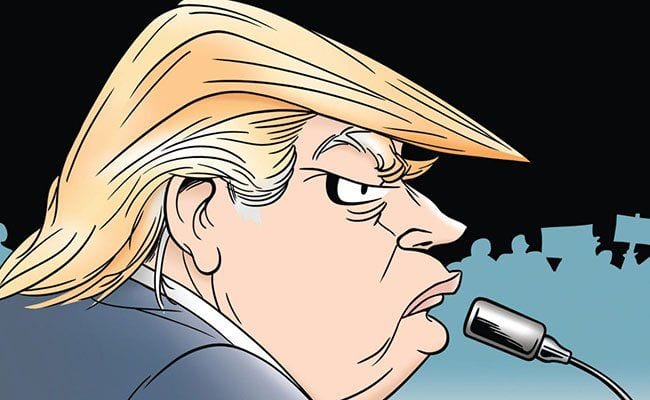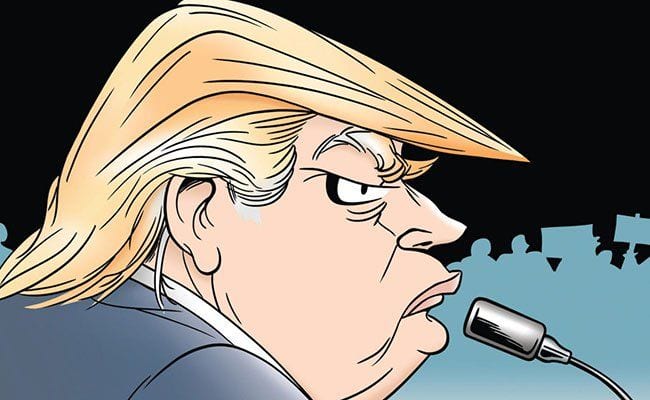
Garry Trudeau’s Doonesbury represents the gold standard of satirical cartooning. The comic strip’s readership has historically skewed liberal. If you’re a conservative who disagrees with his progressive politics, or even if you’re just someone who lacks an interest in keeping up with more than four decades of serial witticism and character development, this new compilation of Trudeau’s riffs on Donald Trump is something all of the electorate is in a position to appreciate, because it revolves around money and publicity more than it showcases Trudeau’s political opinions. The comic strip filters a comprehensive and representative mix of the subject’s real commercial projects and soundbites through the withering snark of his fictional characters’ worldview, arriving at an alarmingly plausible parallel universe that, in hindsight, was incredibly on the nose.
One of the things that makes Doonesbury so great at taking down the master of takedowns is indeed simply that Trudeau has been at it for so very long, with a Pulitzer resting on the office shelf by 1975, just as Trump assumed control of his father’s construction empire. Fans and foes of the comic strip were not surprised to see the publication of his 40th anniversary collection in 2010, but perhaps some will be shocked by the extent to which his newest collection, Yuge!, proves just how astutely Doonesbury had pegged Trump from the very beginning – 30 years ago. The cartoonist began throwing prescient darts in September of 1987 when Trump, for some reason, explicitly declared that he was not seeking the office of the presidency. If I had five bucks for every time I have needed to use the phrase “Trump for some reason explicitly declared”, I could quit my job and retire immediately.
Perhaps I could retire aboard the Trump Princess, which Doonesbury laid out in all its gaudy glory in 1988-89. This is the best stretch in the collection, in large part because it demonstrates the most skill in forcing a collision between Trump and the characters of Doonesbury. There are more than 20 regular characters in the strip, and keeping up with their miscellaneous connections can be trying, even for devoted fans. The section on Trump’s luxury yacht can stand alone using a few of these characters without giving much of their hefty backstory. The bulk of this section’s plot rests in the capably shady hands of Uncle Duke, who is basically Hunter S. Thompson, beloved gonzo journalist who calls ‘em like he sees ‘em — often through the delightfully irresponsible lens of aviator shades tinted by acid trips. Trump hires Duke to be his yacht captain; they agree on a lot of stuff despite mutually regarding each other as incompetent.

Trudeau later pits Duke against Trump for the presidency in the ’90s. Duke hires Boopsie the actress to compete against Trump’s second wife, Marla Maples, believing that sexy arm candy is Trump’s only advantage in the contest for the White House. The book also delights in the form of some satisfyingly inevitable conclusions; for example, when a character realizes the bogus credentialing of Trump University has cost him a pile of cash, a scenario that is ripe for Trudeau’s Yale-educated, yawning sarcasm. Yuge! is full of great countercultural stabs against the darkness of all things that bear Trump’s uniquely tacky brand of capitalism.
Notably, as the collection careens toward our present day incarnation of Trump, Trudeau does not rely whatsoever on The Apprentice. Skipping the more obvious jabs at celebrity-obsessed culture and tabloid-based worldviews, Doonesbury always digs deep for the jugular. That’s the truly impressive thing about Yuge!, because news media everywhere are at this very moment scrambling mightily for ways to successfully cover Trump’s ascension to the Republican nomination in a way that professionally but clearly conveys he is unfit to win the election in November. Where journalistic concern for the ethics of election coverage has resulted in a crisis of conscience for many hard news reporters, the cartoonist is comparatively free to carry on ever more leftward in retelling a story grounded in those same facts that nightly news broadcasters are bound to deliver with a straight face.
What Trudeau captures over and over again is the sheer baseness of Trump’s rhetoric. Courtesy of all the free television coverage he’s getting, we are immersed in a steady, daily deluge of Trump talk. It’s this streaming that’s killing us — the constancy of unforced errors, the consistency of willful disregard for political process, the complete delusion with which one man pursues his selfish ambitions in public. Do your mind (and soul) a favor: turn off the television and pick up this book instead. One little black box at a time, Trudeau succeeds in isolating Trump’s words so they have a moment of silence in which to resonate, dawning upon the reader as a truly fresh and quiet horror.

In some ways, the best page of the book is right there between the cover and the front matter, even before page one: a giant collage of Trump’s words rendered one bubble at a time until the page is covered with a teeming mass of insulting malarkey. From “total loser” and “major sleaze” to “third-rate” and “desperate”, seeing the candidate’s actual words decontextualized from particular times and places then thrown back in his face can be quite a powerful salve.
The cherry on top is the back cover, slathered with a large collection of choice negative words Trump has flung at Trudeau for the past 30 years. At the Republican National Convention in 1988, Trump’s first appearance there to support George H.W. Bush, Doonesybury was at the top of his mind because the aforementioned yacht plot was running at that time. Fielding reporter’s questions about it there and often since, he variously declared Trudeau has “got overrated talent”, that “very few people read what he writes”, and of course that he is a “total loser”.
The epigraph from Trump, his amusing claim that “I know words. I have the best words”, becomes his epitaph in the hands of Trudeau. Yuge! highlights the problem with modern media coverage of Trump: it’s trying to do too many things at once. If you’re tired of hearing the daily laundry list of all the very many dangerously dumb things Trump has said, go back to Doonesbury, because any single instance of the candidate’s demeaning rhetoric used to be enough for the American people to disapprove of a temperament like this. We have far more than enough evidence to dismiss Trump; the problem is that we have lacked focus.
Bless Trudeau for taking a res ipsa loquitur approach that lets the thing speak for itself — for once again elevating his readership in such a timely and elegant manner, and for keeping us laughing at the sharpness with which he does it.


![Call for Papers: All Things Reconsidered [MUSIC] May-August 2024](https://www.popmatters.com/wp-content/uploads/2024/04/all-things-reconsidered-call-music-may-2024-720x380.jpg)



